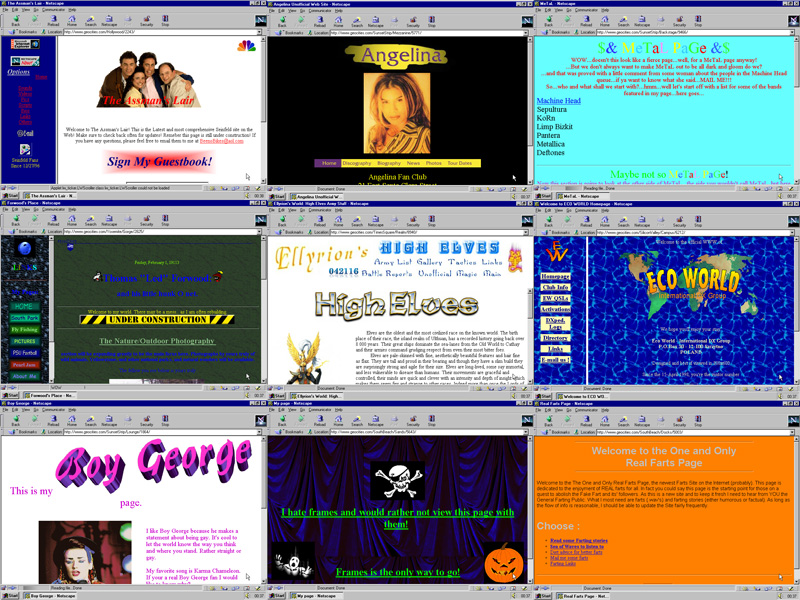Founded in 1994, Beverly Hills Internet was a Web hosting business based in California. In mid-1995, it offered customers with no knowledge of HTML the ability to create home pages. Called ‘Homesteaders,’ they could choose to set up their homepage within six neighbourhoods. The Colosseum neighbourhood for sports sites, Hollywood for entertainment sites, RodeoDrive for shopping, SunsetStrip for music, WallStreet for business and WestHollywood for the Gay and Lesbian community.
The free service was immediately popular. Chat, bulletin boards and other community elements were added. By the end of 1995, thousands of ‘Homesteaders’ were setting up websites everyday a day. The founders decided to drop their hosting business and focus on the growing community. They renamed it GeoPages, later changing it to GeoCities.

GeoCities screenshots captured from Olia Lialina and Dragan Espenschied’s Tumblr ‘One Terabyte of Kilobyte Age’.
Over the next few years, new neighbourhoods, paid services and advertising were added. By the end of 1999, GeoCities was the third-most visited site on the Web. Yahoo! saw an opportunity to add community elements to its offer and bought the company for $3.5 billion.
Despite the popularity of the site, GeoCities ran at a loss. Yahoo! introduced paid for hosting and capped free accounts at 3GB of traffic per month. Unsurprisingly, Homesteaders left in bulk to try out new self-publishing platforms, like Live Journal. The emergence of social networks, like MySpace and Facebook, were the final nail in the coffin. In 2009, GeoCities was shut down.
“Innovate or die” is an often-heard phrase in the computer industry. GeoCities proves it to be true. Between 1995 and 2009, forty-million homepages were built on GeoCities. Its template driven homepages could be created in minutes. With hosting, FTP and URLs all built in, it was a one-stop shop for non-technical people to get on the Web. Ultimately, WordPress and Facebook copied this model and did it better. GeoCities died from neglect.
Thanks to the digital preservation heroes at the Archive Team and independent archiving efforts like Reocities and Oocities, a lot of GeoCities has been saved. The importance of these initiatives can’t be underestimated. As Reddit founder Alexis Ohanian neatly put it, GeoCities is where many of us “lost our HTML virginity”
The tools may have changed but our desire for self-expression hasn’t. The designs were lurid and the content banal but GeoCities introduced self-publishing to the masses. It was the training ground for the first generation of bloggers. Without it the Web would have been a less interesting place.
This is an extract from 100 Ideas that Changed the Web, available on Amazon UK and Amazon US.

Pingback: 100 Ideas that Changed the Web | Digital Archaeology
Pingback: 100 Ideas that didn’t Change the Web | Digital Archaeology